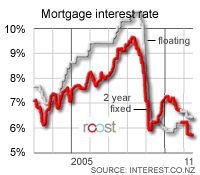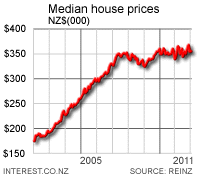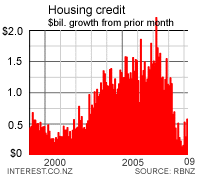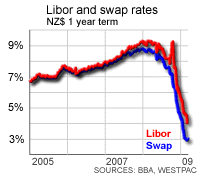 The latest shocking installment of the Credit Crunch will affect New Zealanders, but not in the way many might immediately assume.
I reckon it will reduce our household wealth by cutting house prices and will squeeze our disposable incomes by stopping our debt servicing costs from falling much. It will probably also extend our recession into 2009, but is unlikely to morph into a 1930s style depression.
That was the short version for speed readers without any of the 'why'.
Here's the explanation with a bit more detail.
The instant reaction to the collapse of Lehman Bros and the bailouts of Bear Stearns, Fannie Mae, Freddie Mac and now AIG is being played out in the world's stock markets as I write. The ensuing falls on stock markets will affect a few New Zealanders a little bit, but only a little. Unfortunately the stock market reaction is where the media coverage is focused. This is a mistake.
The latest shocking installment of the Credit Crunch will affect New Zealanders, but not in the way many might immediately assume.
I reckon it will reduce our household wealth by cutting house prices and will squeeze our disposable incomes by stopping our debt servicing costs from falling much. It will probably also extend our recession into 2009, but is unlikely to morph into a 1930s style depression.
That was the short version for speed readers without any of the 'why'.
Here's the explanation with a bit more detail.
The instant reaction to the collapse of Lehman Bros and the bailouts of Bear Stearns, Fannie Mae, Freddie Mac and now AIG is being played out in the world's stock markets as I write. The ensuing falls on stock markets will affect a few New Zealanders a little bit, but only a little. Unfortunately the stock market reaction is where the media coverage is focused. This is a mistake.
 The real impact will take time to trickle through to the things that really matter for most of us: the value of our houses, the interest costs we pay on our housing debt and the interest we receive from our bank deposits.
This is a quick sermon I deliver often, but it's worth repeating. World and New Zealand stock markets now don't matter much to most of us. House prices and interest rates do.
New Zealand's households had a combined net worth of NZ$634 billion at the end of 2007, according to RBNZ figures. Our houses were worth NZ$617 billion or 97% of our net wealth. We had NZ$170 billion worth of debt, which includes about NZ$160 billion of mortgage debt and the rest in credit cards and personal loans. We also had about NZ$80 billion deposited in banks and about NZ$10 billion in finance companies and mortgage trusts. Interest rate changes therefore affect around NZ$260 billion worth of debt and savings. They also indirectly affect house prices and therefore the size of that NZ$617 billion of household wealth.
The real impact will take time to trickle through to the things that really matter for most of us: the value of our houses, the interest costs we pay on our housing debt and the interest we receive from our bank deposits.
This is a quick sermon I deliver often, but it's worth repeating. World and New Zealand stock markets now don't matter much to most of us. House prices and interest rates do.
New Zealand's households had a combined net worth of NZ$634 billion at the end of 2007, according to RBNZ figures. Our houses were worth NZ$617 billion or 97% of our net wealth. We had NZ$170 billion worth of debt, which includes about NZ$160 billion of mortgage debt and the rest in credit cards and personal loans. We also had about NZ$80 billion deposited in banks and about NZ$10 billion in finance companies and mortgage trusts. Interest rate changes therefore affect around NZ$260 billion worth of debt and savings. They also indirectly affect house prices and therefore the size of that NZ$617 billion of household wealth.

 Since March those international funding costs have eased a bit and the Reserve Bank of New Zealand has cut the Official Cash Rate (OCR) by 75 basis points to 7.5%. Over that time the average 2 year fixed rate mortgage has dropped back to 8.8% again. But we're still back where we started in mid 2007 when the OCR was 8.25%.
The net effect then is that our fixed mortgage rates would have been about 70-80 basis points lower without the Credit Crunch. For someone with a NZ$200,000 mortgage that's about NZ$30 a week.
So what happens from here?
The collapse of Lehman Bros, the forced sale of Merrill Lynch and the rescue (nationalisation) of AIG have shocked markets and foreign lenders all over again. The margin Australasian banks (ANZ, CBA, NAB and Westpac) pay above the safest kind of government debt has blown out again from around 150 basis points to around 200 basis points.
That means it's likely they'll have to pay an extra 50 basis points to foreign lenders whenever they choose to refinance their foreign debt. About NZ$60 billion of the foreign debt held by our banks has to be refinanced every 90 days.
How long could this go on for? Most observers say the world's banks have written off about US$500 billion and they need to write off about US$1.2 trillion. That says we're about half way through it, although some say the second US$500 billion of writeoffs (and the necessary capital raisings to go with them) could happen faster. It could happen through a series of collapses that wipes out the equity held by investors.
However fast it happens, the end result is likely to be more expensive foreign debt. That will be passed on in our fixed mortgages, either by increasing rates or by not passing on cuts in the OCR. I reckon there's another 70-80 basis points of 'higher' (meaning not lower) interest costs to be built into fixed mortgage rates.
Combined with the earlier increase, that means about NZ$50-60 a week or 150 basis points of extra interest costs for someone with a NZ$200,000 mortgage. Given the Reserve Bank is likely to cut the OCR by another 50 basis points on October 23, that is likely to mean most of that rate cut will not be passed on to fixed rate borrowers.
These higher interest rates for longer will all intensify the downward pressure on house prices, but it may be a less obvious factor that reduces household wealth. Banks have already started rationing credit by lifting credit standards.
Kiwibank's 8.49% rate for its special 2 year fixed rate mortgage only applies to borrowers with 20% equity, as does The National Bank's 8.3% rate for its special 30 month fixed rate mortgage. Much more of the rationing is done behind the scenes.
The proof is in the new lending figures disclosed by the banks every month to the Reserve Bank. Net new mortgage lending collapsed to NZ$229 million in July from NZ$1.24 billion in the same month a year ago.
The implosion of the property finance company sector has further withdrawn credit from the property development and property investing markets. The worsening of the global Credit Crunch will extend this deleveraging of cheap and easy debt from the housing market.
We've predicted a 30% fall in the average house price between November 2007 and the end of 2009. We're still on track for that.
But aside from asset prices and interest rates, what might happen to the real economy?
Some people are comparing this event to what happened before the Great Depression.
Even Alan Greenspan has said it is possibly the worst financial crisis in the last 100 years, suggesting it may even be bigger than the crash of October 1929. Greenspan should know. He was growing up during the Depression and spent much of his whole career learning the lessons of what caused the Depression and how to avoid one in the future. The defining moments of his period as Federal Reserve Chairman were his response to financial crises: the 1987 market crash, the 1998 Long Term Capital Management crisis (LTCM), the fallout from the bursting of the dot com bubble and the aftermath to the 9/11 attacks.
Many believe his reactions to these crises sowed the seeds for the reckless lending that created the massive leveraging within the US financial system and the housing markets globally. He organised the bailout of LTCM and kept interest rates obscenely low (1% for much of 2003) to protect markets.
Regardless, Greenspan cannot be ignored.
So why wouldn't a financial crisis turn into an economic crisis like it did from 1930 to 1938?
It's different this time...it really is. For all their faults, our financial institutions are much more sophisticated and diverse than they were in 1930. We have flexible exchange rates and monetary policies that will naturally stabilise the global economies. We have at least two other engines of economic growth that did not exist in the 1930, including China, India and Brazil. The US authorities seem absolutely determined to bail their way out of the financial crisis, reliquefying and inflating its way out of trouble. That didn't happen from 1930 to 1933.
Global trading systems and rules are much more robust and widespread than in the 1930s. It's very unlikely we'll see a roll back of free trade in the way that trade was restricted in the Depression.
Our economy, along with the global economy, will go into an extended slowdown that could see many enter shallow recessions. New Zealand's own economy will probably now remain in recession through the rest of 2008 as the forces of deleveraging on the housing market and slowing global growth keep a lid on any bounceback.
Since March those international funding costs have eased a bit and the Reserve Bank of New Zealand has cut the Official Cash Rate (OCR) by 75 basis points to 7.5%. Over that time the average 2 year fixed rate mortgage has dropped back to 8.8% again. But we're still back where we started in mid 2007 when the OCR was 8.25%.
The net effect then is that our fixed mortgage rates would have been about 70-80 basis points lower without the Credit Crunch. For someone with a NZ$200,000 mortgage that's about NZ$30 a week.
So what happens from here?
The collapse of Lehman Bros, the forced sale of Merrill Lynch and the rescue (nationalisation) of AIG have shocked markets and foreign lenders all over again. The margin Australasian banks (ANZ, CBA, NAB and Westpac) pay above the safest kind of government debt has blown out again from around 150 basis points to around 200 basis points.
That means it's likely they'll have to pay an extra 50 basis points to foreign lenders whenever they choose to refinance their foreign debt. About NZ$60 billion of the foreign debt held by our banks has to be refinanced every 90 days.
How long could this go on for? Most observers say the world's banks have written off about US$500 billion and they need to write off about US$1.2 trillion. That says we're about half way through it, although some say the second US$500 billion of writeoffs (and the necessary capital raisings to go with them) could happen faster. It could happen through a series of collapses that wipes out the equity held by investors.
However fast it happens, the end result is likely to be more expensive foreign debt. That will be passed on in our fixed mortgages, either by increasing rates or by not passing on cuts in the OCR. I reckon there's another 70-80 basis points of 'higher' (meaning not lower) interest costs to be built into fixed mortgage rates.
Combined with the earlier increase, that means about NZ$50-60 a week or 150 basis points of extra interest costs for someone with a NZ$200,000 mortgage. Given the Reserve Bank is likely to cut the OCR by another 50 basis points on October 23, that is likely to mean most of that rate cut will not be passed on to fixed rate borrowers.
These higher interest rates for longer will all intensify the downward pressure on house prices, but it may be a less obvious factor that reduces household wealth. Banks have already started rationing credit by lifting credit standards.
Kiwibank's 8.49% rate for its special 2 year fixed rate mortgage only applies to borrowers with 20% equity, as does The National Bank's 8.3% rate for its special 30 month fixed rate mortgage. Much more of the rationing is done behind the scenes.
The proof is in the new lending figures disclosed by the banks every month to the Reserve Bank. Net new mortgage lending collapsed to NZ$229 million in July from NZ$1.24 billion in the same month a year ago.
The implosion of the property finance company sector has further withdrawn credit from the property development and property investing markets. The worsening of the global Credit Crunch will extend this deleveraging of cheap and easy debt from the housing market.
We've predicted a 30% fall in the average house price between November 2007 and the end of 2009. We're still on track for that.
But aside from asset prices and interest rates, what might happen to the real economy?
Some people are comparing this event to what happened before the Great Depression.
Even Alan Greenspan has said it is possibly the worst financial crisis in the last 100 years, suggesting it may even be bigger than the crash of October 1929. Greenspan should know. He was growing up during the Depression and spent much of his whole career learning the lessons of what caused the Depression and how to avoid one in the future. The defining moments of his period as Federal Reserve Chairman were his response to financial crises: the 1987 market crash, the 1998 Long Term Capital Management crisis (LTCM), the fallout from the bursting of the dot com bubble and the aftermath to the 9/11 attacks.
Many believe his reactions to these crises sowed the seeds for the reckless lending that created the massive leveraging within the US financial system and the housing markets globally. He organised the bailout of LTCM and kept interest rates obscenely low (1% for much of 2003) to protect markets.
Regardless, Greenspan cannot be ignored.
So why wouldn't a financial crisis turn into an economic crisis like it did from 1930 to 1938?
It's different this time...it really is. For all their faults, our financial institutions are much more sophisticated and diverse than they were in 1930. We have flexible exchange rates and monetary policies that will naturally stabilise the global economies. We have at least two other engines of economic growth that did not exist in the 1930, including China, India and Brazil. The US authorities seem absolutely determined to bail their way out of the financial crisis, reliquefying and inflating its way out of trouble. That didn't happen from 1930 to 1933.
Global trading systems and rules are much more robust and widespread than in the 1930s. It's very unlikely we'll see a roll back of free trade in the way that trade was restricted in the Depression.
Our economy, along with the global economy, will go into an extended slowdown that could see many enter shallow recessions. New Zealand's own economy will probably now remain in recession through the rest of 2008 as the forces of deleveraging on the housing market and slowing global growth keep a lid on any bounceback.
Opinion: What the Credit Crunch means for New Zealanders
Opinion: What the Credit Crunch means for New Zealanders
18th Sep 08, 1:00am
by

We welcome your comments below. If you are not already registered, please register to comment
Remember we welcome robust, respectful and insightful debate. We don't welcome abusive or defamatory comments and will de-register those repeatedly making such comments. Our current comment policy is here.